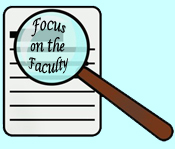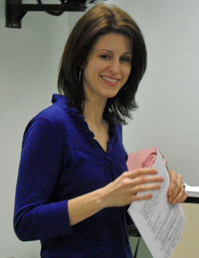Department of Sociology and Anthropology


"A much larger portion of the population loves children, but I have always liked older people. When I took my first gerontology class as an undergrad, I walked in and thought 'Oh, this is great!'"sociology professor Brenda Sanders said.
Sanders is the sociology department's go-to member for anything and everything involving gerontology. She defines gerontology as the multi-disciplinary study of the aging process. Sanders says gerontology focuses more on the social aspect of the aging process and looks at what happens economically, politically, and socially when people get older.
"Gerontology borrows from sociology, psychology, biology, religion and political science. I get to do a little bit of everything."Sanders said.
A self-proclaimed "military brat," Sanders grew up moving from city to city every three years. She attended Baylor University in Waco, Tex. for both her undergraduate and graduate degrees, and received her master's degree in the science of gerontology.
Sanders came to College of Charleston in 1995, and teaches such classes as, Introduction to Sociology, Aging and the Family, and Social Gerontology. She also serves as the gerontology internship coordinator for the sociology department.
Sanders says that her position as a senior instructor within the sociology department focuses less on detailed research, and more on the hands-on application of gerontology in everyday life.
"I focus on internships and service learning and facilitating my students actually being out and working with parts of the older population,"Sanders said. "When I originally started in the field of gerontology I thought I would be working with older people. It never occurred to me that I would be teaching younger people about working with older people."
Sanders is currently working with a student who serves as an intern for a geriatric care manager. "This student gets to see all the different angles of gerontology,"Sanders said. "The student gets to go and actually talk to older people in their homes and also arranges for the resources they may need in the community."
Sanders frequently speaks with elderly people about the aging process, and her position as a professor of gerontology. "Often what they're excited about is that I have students who are taking gerontology classes,"she said. "They sometimes think that society as a whole is not thinking about them, so it really speaks to them that there are 20-year-olds who are interested in aging."
Sanders' current gerontology class is partnered with Respite Care Ministries in Charleston, where she requires her students to volunteer six hours a month. The students' volunteer work with the elderly helps them fulfill the course's service learning requirement.
Senior sociology major Katie McSavaney says she thoroughly enjoys that the class allows her to be so hands-on. "The service learning part of the class is definitely my favorite thing about it," she said. "It puts everything we learn about in class into perspective, and also into action."
McSavaney added that Sanders has a way of teaching gerontology that makes it different from other sociology classes. "The way Professor Sanders teaches the class, it allows you to see the realness of gerontology by looking at the big picture, rather than just looking at it from a purely academic standpoint by reading textbooks," she said. "Professor Sanders is not only immensely passionate about gerontology, but she is also so educated about it, and you can tell."
When speaking with Sanders, it is very easy for one to identify just how much she loves her field of work. "The better we understand aging, the easier it is for us to eventually make that progression in our lives," Sanders said. "In society, we spend a lot more time trying to not think about getting older than we do actually thinking about it as a process."
Sanders says the most rewarding aspect of her job is that she gets to inspire students to pursue careers in her field. "I now have several former students that discovered a passion for gerontology when I taught them. Many of them are now employed in Charleston in the aging network, and supervise interns that I advise," she said.
Sanders says that progressions and advancements in gerontology occur frequently because it is a multi-disciplinary field. However, she says that a significant milestone in her field is happening soon, which she expects to change the way society thinks about aging.
"The biggest thing that is about to happen starting next year is the first of the baby boomers turning 65," Sanders said. "It is something that always seemed far off, but now, here we are with the first of the 80 million baby boomers beginning to reach retirement age."
When Sanders is not working, she is involved in a book group, and is also an active member of her church. "My church is in the process of starting up a ministry right now to reach out to older members of our congregation who are not able to attend services anymore. When I heard about this I said, 'Count me in!'" Sanders said.
Although Sanders works closely with the elderly community, she also experiences aging from a different perspective. Sanders is the proud mother of two children, ages 4 and 2. "I have a lot of age diversity in my daily life," Sanders joked.
###